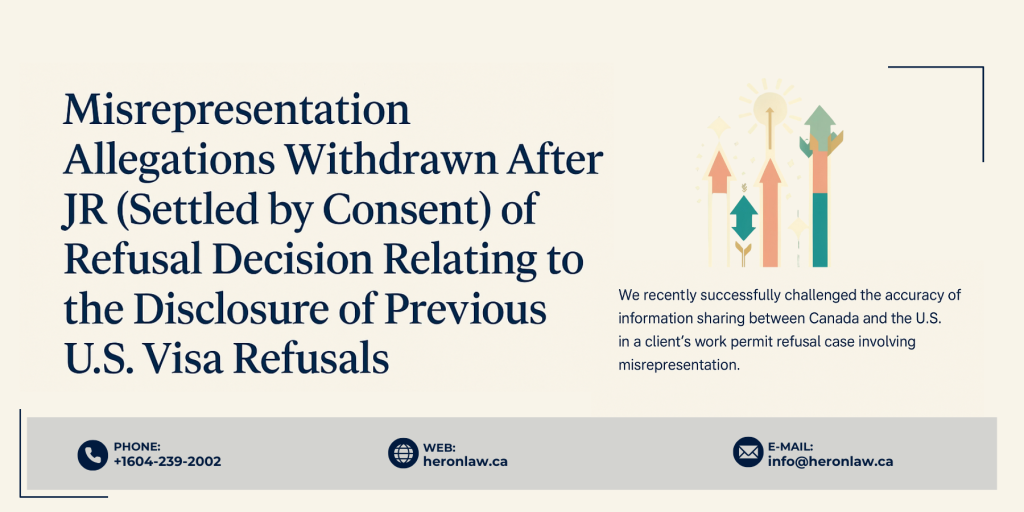Heron Law Offices recently resolved a judicial review (JR) matter involving alleged misrepresentation in a Canadian work permit refusal. The case was settled by consent, and the refusal decision was set aside. This outcome highlights key issues in cross-border information sharing between Canada and the U.S., and the importance of challenging inaccurate immigration records.
Background: Work Permit Refusal Based on U.S. Visa History
We recently successfully challenged the accuracy of the information sharing system between Canada and the U.S. in the context of a client’s refused work permit due to misrepresentation.
Per the Global Case Management System (“GCMS”) notes obtained from Immigration, Refugees and Citizenship Canada (“IRCC”), our client’s work permit application was refused for failing to disclose four previous U.S. visa refusals.
Our client listed one refusal in their application and they later remembered a second refusal from 14 years prior, which they admitted to in a response to a Procedural Fairness Letter (“PFL”), but they had no knowledge of the other two refusals.
Challenging the Accuracy of IRCC’s Records
We filed an application for leave and for judicial review. Our client then made a Freedom of Information Act (“FOIA”) request to U.S. authorities to confirm his immigration history.
The FOIA request revealed discrepancies in the dates IRCC claimed to have been undisclosed refusals. Notably, our client was granted a U.S. visa on one of the days he was alleged to have been refused and he submitted a U.S. visa application on the other day in question. This shows that information from the U.S. accessed or accessible by Canadian immigration authorities is not necessarily accurate.
Judicial Review and Settlement
After receiving the Certified Tribunal Record (“CTR”), which lacked particulars about the U.S. refusals, we advised opposing counsel that we would pursue a motion.
Less than two weeks later, the Minister proposed to settle the matter, set aside the work permit refusal, and have the application redetermined by a different officer. Our client accepted to discontinue the judicial review application.
In this client’s case, they were issued a Confirmation of Permanent Residence (“COPR”) under the Provincial Nominee Program (“PNP”) around the same time as the work permit refusal and they were prevented from coming to Canada because of the misrepresentation allegations.
Our office wrote to IRCC requesting that the work permit application be withdrawn on the basis that it will not be needed if he is able to arrive in Canada as a permanent resident, to which IRCC agreed.
What This Could Mean for You as a Client
If you were in the same position as our client, the consequences could have been severe. Being accused of misrepresentation—especially over past visa refusals you may have forgotten or not known about—can result in:
- A refusal of your current application, even if you’re otherwise eligible;
- A five-year ban from entering or applying to Canada;
- Delays in family reunification, employment, or permanent residency; and
- Emotional stress and reputational damage, especially if the allegation is based on a misunderstanding or incorrect or incomplete information.
In our client’s case, they was nearly barred from entering Canada despite having already been approved for permanent residence. Without challenging the record and pursuing judicial review, the client may have lost a vital immigration opportunity.
Why This Matters
This case is a critical reminder that even good-faith omissions or outdated records can be misinterpreted as misrepresentation. It also underscores the fact that cross-border data shared between U.S. and Canadian immigration systems is not always accurate, and that clients have the right to challenge unfair decisions through legal means.
If you’ve ever been refused a visa in another country, are applying for Canadian immigration, or simply want to better understand how to protect your immigration status, this article is worth reading. It shows how legal intervention can correct the record and place you back on track for your Canadian immigration pathway.
If you’ve been refused a Canadian visa or face a misrepresentation allegation, our team can help. Heron Law Offices provides client-centered, evidence-based representation for complex Canadian immigration matters.




